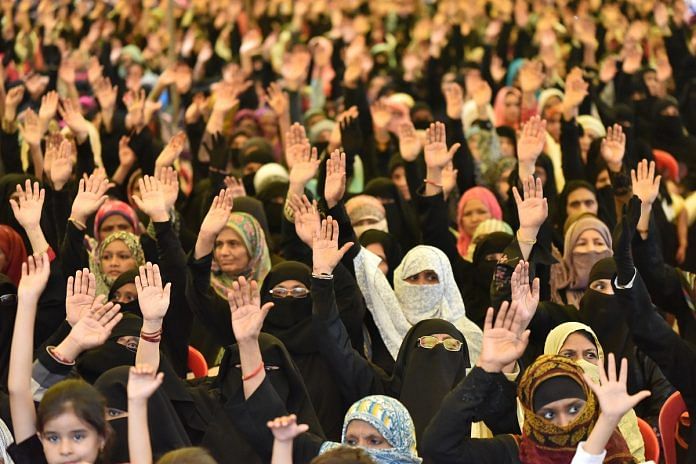Government’s tokenism will only end up causing more trouble while leaving out glaring violation of Muslim women’s rights.
The Narendra Modi government may hail the legislation on criminalising triple talaq as a victory for Muslim women, but the problem areas have been conveniently overlooked.
The problem with the triple talaq bill is that it seeks to provide a criminal law solution to a civil law issue of divorce. Uttering talaq thrice does not translate into divorce, as per the Supreme Court verdict. So in reality, the “offence” is desertion and leaving the wife as a destitute as law minister Ravi Shankar Prasad puts it.
Leaving the wife in a lurch is not an offence so far, but now it will be for only Muslim men. Muslim Women (Protection of Rights on Marriage) Bill, 2017 is nothing more than an eyewash because the bill serves no purpose other than providing a legal framework to target Muslim men.
Also read: Essential to distinguish religion from practices for Muslim women to progress
While the government insists that criminalising marital rape or decriminalising adultery or allowing same-sex partnerships will break down the institution of marriage, Muslim marriages clearly don’t need protection.
An exception seems to have been made for Muslim marriages by prescribing a three-year jail term for men pronouncing instant triple talaq.
If you move past this huge discriminatory motive of the law, the question of how the offence can be proved still remains. The law places the burden of proving the offence on the wife. Apart from cases where instant triple talaq is pronounced over texts and emails, the rest will remain highly contested.
In most gender-protection laws, like rape laws in the IPC, dowry laws or the Domestic Violence Act, the onus is on the man to prove he did not commit the offence. Without substantial amendments to this effect, the triple talaq bill is unworkable.
A rather practical approach to the instant triple talaq issue is perhaps provided by Congress MP Husain Dalwai’s private member bill in 2016. It sought the abolition of instant triple talaq by laying down a procedure for both court divorces and outside-court divorces that allows both husband and wife enough time to reconsider.
Also read: Muslim women may stand to lose more from proposed law criminalising instant triple talaq
But the government’s tokenism will only end up causing more trouble. While focusing on instant triple talaq, it is leaving out other glaring violations of women’s rights in nikah halala – which requires a divorced woman to marry another man, consummate the marriage and divorce him if she wants to remarry her previous husband. Conveniently, even the apex court did not pick up this issue while deciding on triple talaq.
It is dangerous to regulate civil aspects by bringing penal consequences. If the aim is to protect the interests of Muslim women, then attempt must be made towards securing maintenance and alimony for them instead of sending the man to jail.
Prasad asked the Congress why it spoke of securing maintenance and alimony to the aggrieved wife when that provision is not permitted in dowry laws or the Domestic Violence Act.
That is because those offences, which involve battery and physical harm, are inherently covered under criminal laws unlike pronouncing instant triple talaq wherein provisions to protect rights of the wife are not prioritised.
“Watered-down bill” for Rajya Sabha
Although the Congress, fearing the label of being a Muslim supporter only put up a feeble fight against the bill in Lok Sabha and eventually voted on it, it has made some noise in the Rajya Sabha.
The government seems to have provided two concessions to get the opposition on board – to make the offence ‘bailable’ instead of ‘non-bailable’ and to ensure that only the affected wife or her blood relations can complain against her husband.
The first concession is tricky since non-bailable doesn’t mean that the man will be entitled to bail rather it will be the judge’s discretion to grant one. The second concession, however, is significant because it avoids a situation where a grudging neighbour or a minority hater can simply file a case against a Muslim man.
Despite these changes, the triple talaq law will have a tougher test in the courts.
Also read: The government must stop mansplaining triple talaq to Muslim women




Maybe the law should have banned triple talaq among Christians, Parsis, Hindus and Jews for it to count as secular… But wait!! 😉